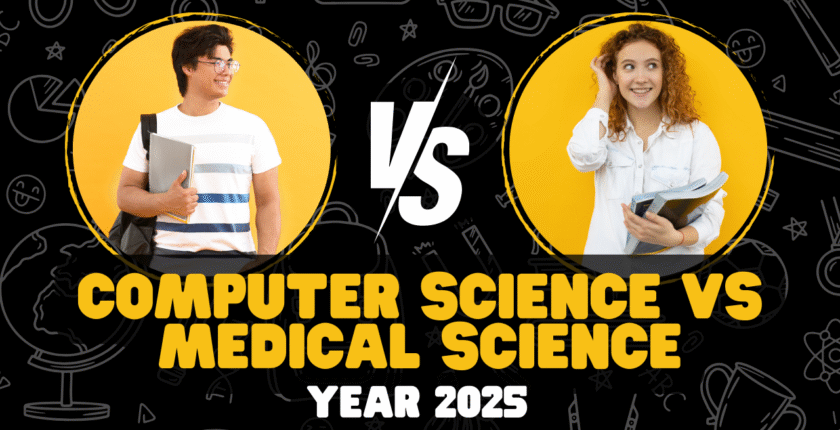Computer Science vs Medical Science — Comparison Between the Courses & Career Prospects
Introduction
Most career choices made today, within the realms of science, boil down to a few highly transformative fields, amongst, of course, computer science and medical science. Both domains have informed some of the modern world in fundamental ways. We have seen groundbreaking technology in fields such as computer science, which has changed the way we work, communicate, and live — and medical science, which recently has increased our life span, eliminated disease, and improved human health. What choosing between these two fields meansChoosing not only a profession, but a mode of positive impact on society, and the nature of how this daily work will change lives, and the level of skill and commitment necessary. In this blog post, we will compare these two domains based on their scope, education, things to do, challenges, opportunities, and impact on the world.
Understanding the Fields
Computer Science
Abstract: Computer science is the study of computers and computational systems. It encompasses creating software, writing algorithms, analyzing data, developing AI, and protecting against cybersecurity. The truth about computer science is that it is not just writing computer programs. Computer Science powers many of the innovations in the world today from mobile applications to self-driving cars. This job entails designing systems to automate various processes, enhance communication, and facilitate access to critical information.
Medical Science
The study of human health, preventive health, diagnosis and treatment with science-based methods is known as medical science. It includes a variety of fields, including anatomy, physiology, pathology, pharmacology, and clinical practice. The operation of medical science, encompassing theoretical knowledge and practice, harmonizes to foster the overall well-being of humanity and protect lives. From vaccines to surgeries to the management of a plethora of chronic diseases, the overarching aspiration of medical science is to improve the quality and length of human life. Healthcare professional in this area work directly with patients, research institutions, and healthcare systems to achieve good health outcomes.
Educational Pathways

Computer Science Education
A bachelor’s degree in computer science, software engineering, information technology, or a related field is generally a prerequisite for becoming a computer science professional. Their students study programming languages, algorithms, data structures, databases, operating systems, and computer networks. A master’s degree or a PhD in a field such as artificial intelligence, data science, human-computer interaction, or cybersecurity would enable you to specialize further for example. Formal education lays the groundwork, but self-taught skills, certifications, and portfolio projects also carry weight in the field of computer science; thus, combining practical experience with lifelong learning is essential.
Medical Science Education

A career in medical science involves a longer, very regimented course of study. Students usually take premed studies that focus on biology, chemistry, and physics before getting into medical school. Medical school is dispersed over four to six years, and includes a curriculum of theoretical subjects and clinical training. After that, they can enter a residency program which can span several years depending on what specialty he/she chooses. Subspecialties like cardiology or neurosurgery require additional fellowship training. Medicine requires not just academic success, but success in high-stress real world clinical environments where you are making decisions impacting patients.
Nature of Work
Computer Science Professionals
As a computer scientist or software engineer, your job may include designing and developing software applications, creating algorithms to solve specific problems, managing databases, or working with you to work with a new technology such as machine learning and blockchain. The nature of many roles in this area is remote, empowering an approach focused on latitude and flexibility for professionals working in this field. It usually consists of team work, solving problems and translating user requirements into usable technology. Although most of the work is not strenuous, it does require a great deal of mental agility, creative thinking and detail-oriented attention.
Medical Science Professionals
The work of medical professionals is related to human health, their duties include physical examination, medical procedures, image reading, laboratory tests, but absence of communication with patients. They may work in a variety of settings including hospitals, clinics, research facilities, or public health organizations. Those in the medical field are required to work under high stress, making educated decisions quickly, and relay information to patients as well as other health workers in an affective manner. While many computer science roles operate on a system of flexibility, medical roles can not do this and are required to be in the workplace physically.
Skills Required
Computer science technology professionals should be logical thinkers skilled problem solvers, mathematically inclined and versatile in using technology by nature. As well as innovation, analytical ability, and teamwork with humans (they still need the humans)”
Medical science professionals require comprehensive knowledge of the human body, quick decision-making skills, empathy to bond with the patients, and stamina to deal with killer emotional and physically draining situations. These skills include tasks like procedures or surgeries, attention to detail specifically when diagnosing patients, and making it in a world where medical advancements happen in a blink of an eye.

Work Environment and Lifestyle
Computer science freelance environments range from corporate offices to startup hubs or home based. Flexible hours are another perk many jobs come with, allowing professionals to better adjust their schedules. But deadlines, project demands and fast shiny-moving technology can fuel stress. Long hours are typical in some roles such as launching a product or resolving a system emergency; however, offering more opportunity for work-life balance than in medicine.
Medical science entails a high-pressure work environment as it necessitates the entire working shift, night shifts and unanticipated emergencies. In fast-paced hospital wards, operating rooms, or specialized clinics; medical professionals in the field. It is more rigorous; there is decreased flexibility for scheduling, particularly among doctors and surgeons. But for many people working in medicine, the gratification of their work is great because they are simply saving and changing lives.
Impact on Society
Computer science also influences society since it governs communication, how businesses operate, education, transportation, entertainment, and even healthcare. Computer science advancements have resulted in technologies such as telemedicine, AI in diagnostics, and electronic health records. AI is one of the most versatile and far-reaching disciplines, affecting nearly every aspect of modern life.
It is directly related to human health, curing illness and injury and the chronic treatment of diseases. And because it concerns life, death, and quality of life, its impact is rapid and close to home. Medical science has won over mortal perils, enhanced longevity, capitalized organizations. If computer science is about changing how society functions, then medical science is about changing how society survives and thrives, physical form and form.
Career Prospects
The increase in demand for computer science professionals is constantly rising as industries are transforming towards the digital world. Software development, data science, cybersecurity and AI engineering are highly in demand high paid career paths. Various Aspect of Roles gives freedom like outside job options and even business.
Even now, medical science careers continue to hold top position, as healthcare is one of the necessity services that one cannot do without, irrespective of the economic condition. Pathway it long, but once you reach your goal, you will also get your rewards, job security as a doctor, surgeon or specialist. With older generations populations and specialized care, there will be an increase in demand. So, Computer Science gives you an early salary but Medical gives deep respect and stability in life with an easy social mission.

Financial Considerations
Computer science jobs command high salaries, particularly in leadership, geographic hot spots, or specialization in areas like machine learning and cybersecurity. The pay may be good for beginner positions, as it often is across industries, and then it grows quickly. Salaries, though, may vary by company, role, and region.
Doctors and medical professionals typically command high salaries, especially for specialty work. But they also typically take longer to start earning, because of long periods of education and training that they have to go through. Over the years, the income increases and most experienced doctors earn a right salary plus benefits, including medical insurance, retirement plans, bonuses, etc.
Challenges
Key Challenges in Computer Science: Continuous Update Training, Cyber Madness, and Innovation Pressure Working in the industry is no walk in the park — it is highly competitive, and you have to keep upskilling and adapting to new things.
Health workers face emotional strain from caring for the sick, long hours, and the need to be 100% certain in diagnosing and treating. While the demands of the profession can lead to burnout, the personal satisfaction of saving lives usually outweighs that.

Future Outlook
With new technologies such as quantum computing, artificial intelligence, and augmented reality just around the corner, the future looks bright for computer science. This area of research will further affect medicine, education, finance, and daily life.
The future of medical science is also bright, with significant technical advancements projected in genetics, personalized medicine, biotechnology, and telehealth ushering in the delivery of healthcare itself. Closer collaboration between the fields of computer science and medical science will be invaluable to these developments, since quicker diagnosis, more effective treatment, and ultimately superior health outcomes depend on the new kinds of prediction now made possible by technology.
Conclusion
Computer science and medical science are among the most integrated fields in the modern world and, thus, we hope to alleviate some questions about them and their respective challenges and rewards. Computer science feeds innovation into every industry, allowing local human connectivity to become global, automation of production, and technological evolution. Medical science preserves health, cures diseases, and increases the longevity, and thus brings humans many clear and concrete benefits. These fields can be diversified based on the interests, skills, and lifestyle you see yourself pursuing. Computer science is probably more appropriate for people who are interested in problem-solving and technology and enjoy flexibility in their environment, while medical science is likely better for people who are excited about health and patient care and want a more direct influence on lives from day to day. Whether to choose the first or the latter, both paths yield immeasurable benefits to humanity and often complement each other to find answers to problems neither could solve alone.

